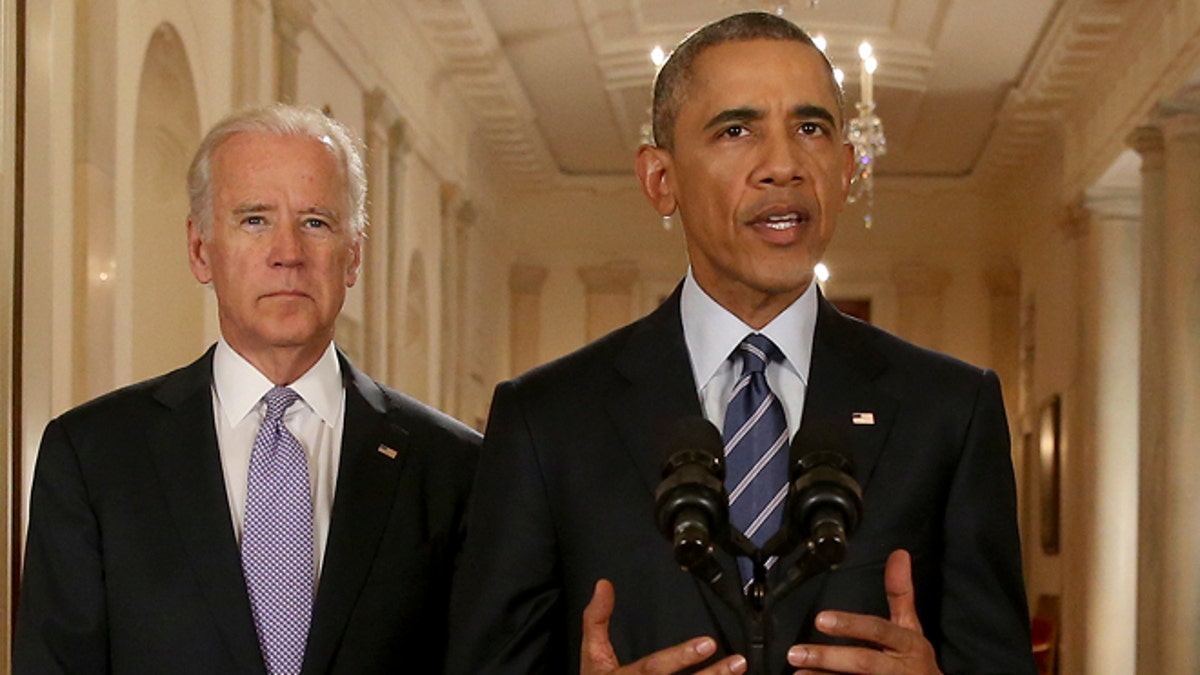
President Obama, standing with Vice President Biden, delivers remarks in the White House on July 14, 2015. (ap)
President Barack Obama's announcement early Tuesday morning of a nuclear deal with Iran was met with derision from many lawmakers in Washington – including many within his own party – especially after he vowed to veto any legislation that would block what is being billed as a landmark move.
The deal cuts off Iran's pathways to building nuclear weapons and forces the Islamic Republic to remove two-thirds of its installed centrifuges and get rid of 98 percent of its stockpile of uranium. Iran will receive phased in sanctions relief as it fulfills the provisions in the deal.
While Obama said that Iran "will not develop a nuclear weapon," many critics in Congress – including those running for the Republican presidential nomination- have issued statements vowing to strike down the deal on Capitol Hill.
Republican candidate and Florida Sen. Marco Rubio said the U.S. gave "concession after concession to a regime that has American blood on its hands, holds Americans hostage, and has consistently violated every agreement it ever signed."
Rubio's Republican rival and Texas Sen. Ted Cruz added: "Today, the international community led by the United States has agreed to not only legitimize and perpetuate the Iranian nuclear program, but also to further arm and enrich the brutal theocratic regime that has oppressed the Iranian people for more than thirty years — a regime that is wrongfully holding United States citizens captive, that is sponsoring radical Islamic terrorism across the globe, and that regularly promotes the destruction of both Israel and America throughout its streets."
The naysaying against the deal didn't come from just the Republican side of the government, but also from some longtime Democratic lawmakers.
New Jersey Sen. Bob Menendez said in a carefully worded statement that while he looks forward to debating the deal on the Senate floor, he has some grave concerns about the language in the deal.
"I'm concerned that the deal ultimately legitimizes Iran as a threshold-nuclear state," Menendez said. "I'm concerned the redlines we drew have turned into green lights; that Iran will be required only to limit rather than eliminate its nuclear program, while the international community will be required to lift the sanctions, and that it doesn't provide for anytime-anyplace inspections of suspected sites."
"The bottom line is: The deal doesn't end Iran's nuclear program — it preserves it," he added.
While the agreement was met with a good deal of unfavorable responses, it did garner some support both at home and abroad.
U.S. Rep. Luis Gutierrez said that "[w]ith the agreement, we are giving peace a chance" and the leading Democratic candidate Hillary Rodham Clinton labeled it as an "important step" that would end up "putting the lid on Iran's nuclear program."
The deal was also praised by many world leaders, with Russian President Vladimir Putin saying the deal with Iran has brought the world "a sigh of relief" and Vatican spokesman Rev. Federico Lombardi telling journalists the agreement "is viewed in a positive light by the Holy See."
Israeli Prime Minister Benjamin Netanyahu, however, said the world is now a "much more dangerous place" and criticized Tuesday's agreement as a "stunning historic mistake."
Speaking in English to reporters in Jerusalem, he said that by removing sanctions, the deal will give Iran billions of dollars to support what he calls a worldwide terrorism network.
He also said it "repeats the mistakes" of an earlier international agreement with North Korea, in which international inspections failed to prevent the country from developing a nuclear weapons capability.
The Associated Press contributed to this report.




